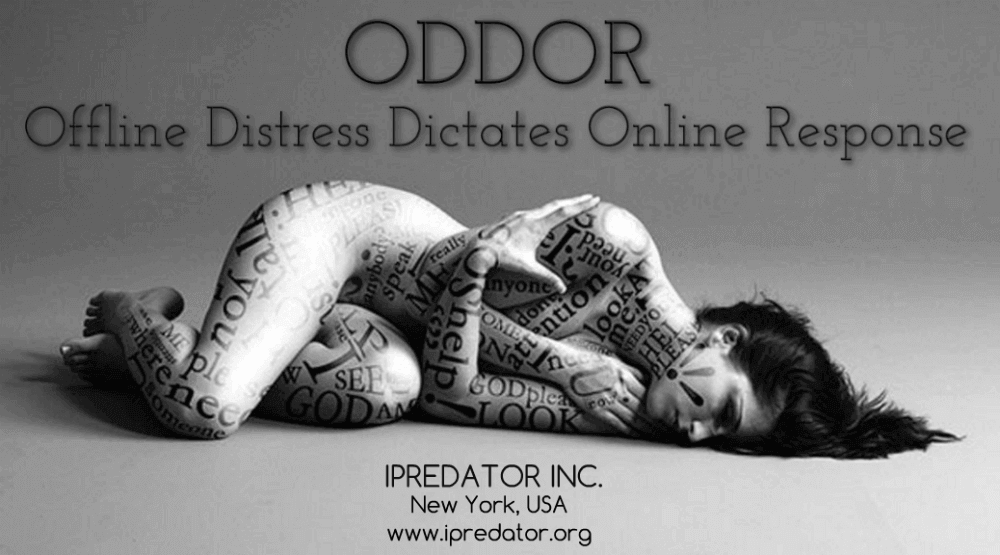Michael Nuccitelli, Psy.D., Olga Vera, Ph.D. and iPredator
The Story Behind the Story with A. True Ott
Internet Radio Interview
Show Description: Join internet radio show host, A. True Ott, Ph.D. of the “The Story Behind the Story” on Friday October 23, 2015 as he interviewed the author of the iPredator construct, Michael Nuccitelli, Psy.D. and Olga Vera, Ph.D. of the University of Colorado Boulder. The topics covered include the underpinnings of Dr. Nuccitelli’s iPredator theory, his iPredator sub-construct ODDOR (Offline Distress Dictates Online Response) and the impact of the Information Age upon teens, young adults and college students.
Date/Time: Friday October 23, 2015 (10pm-12am EST, 8pm-10pm MST, 7pm-9pm PST). To listen at a later date, the show is available by clicking on the radio image here. As of 10/29/15, the first hour of the show is uploaded for listening with the second hour to follow at a later date.
ODDOR
Offline Distress Dictates Online Response (ODDOR) is a sub-tenet of iPredator, which posits that offline psychological functioning directly influences one’s online interactions. Whether someone is an online assailant, cyber-attack target or both, ODDOR does not discriminate. ODDOR postulates that temporary and long-standing psychological states can significantly taint an online user’s behaviors and interpretations. Perceptually isolated, ignorance of the existence of ODDOR and experiencing atypical affective and cognitive states increases the probability of being targeted by an online assailant. In addition to being at a greater risk of being cyber attacked, ODDOR influences an online user to partake in destructive and self-destructive online activities.
If a person is self-aware and reasonably healthy, their levels of ODDOR are less likely to become problematic. Just as self-awareness acts as a buffer between mental health and dysfunction, the same holds true for ODDOR. An online user’s risks of engaging in destructive and self-destructive behaviors are greatly diminished by monitoring one’s attitude before and during ICT usage. The ODDOR factors online users must be mindful of include
- Using ICT in an altered state of consciousness.
- Using ICT with an amplified sense of optimism or fatalism
- Using ICT to explore deviant or dark internal fantasies.
- Using ICT in a heightened state of distress, anger or carelessness.
- Using ICT with a medical condition that impacts intellectual functioning.
- Using ICT during affective states that are isolation or rejection themed.
- Using ICT during interpersonal conflicts and environmental stress.
ODDOR has minimal impact when an online user is cognizant of how others can misinterpret their perceptual biases and color the information they aggregate, disseminate and exchange. ODDOR poses a minimal risk when an online user’s faculties responsible for self-preservation are functioning properly in all online environments.
Olga Vera, Ph.D.
Olga Vera, Ph.D. is a Licensed Clinical Psychologist in the state of Colorado with over 22 years of experience working in a variety of settings in the mental health field serving as an administrator, professor, trainer, and clinician. Dr. Vera is presently the director of Faculty and Staff Assistance Program and the Chair of the Behavioral Intervention Team for the University of Colorado at Boulder and has a thriving clinical practice in Boulder Colorado. Dr. Vera served as the President for the International EAP Association and is currently the President Elect for the Colorado Psychological Association.
Dr, Vera is considered a trauma expert in the field of psychology. Dr. Vera specializes in trauma informed treatment and the development of trauma informed care and clinical practices. Dr. Vera assists organizations and educational institutions to develop researched based solutions to improve the health of individuals, organizations, and systems.
Michael Nuccitelli, Psy.D.
Michael Nuccitelli, Psy.D. is a NYS licensed psychologist, cyberpsychology researcher and online safety educator. In 2009, Dr. Nuccitelli finalized his dark side of cyberspace concept called iPredator. Since 2010, he has advised those seeking information about cyberbullying, cyberstalking, cybercriminal minds, internet addiction and his Dark Psychology concept. By day Dr. Nuccitelli is a practicing psychologist, clinical supervisor and owner of MN Psychological Services, PLLC. After work and on the weekends, he volunteers helping online users who have been cyber-attacked. Dr. Nuccitelli’s is always available to interested parties and the media at no cost. This website and everything created by Dr. Nuccitelli is educational, free and public domain.



